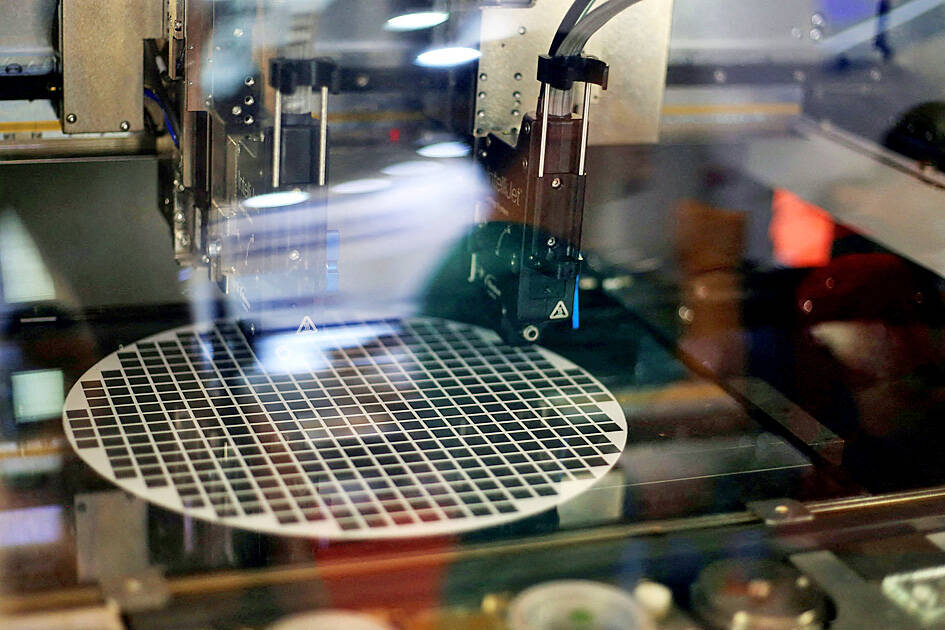Taiwan is expected to be the world’s largest semiconductor fab equipment spender next year at US$23 billion, due to heavy spending by local foundry companies led by Taiwan Semiconductor Manufacturing Co (TSMC, 台積電), international trade group SEMI said yesterday.
Taiwanese chipmakers would spend 4 percent more next year on fab equipment than this year, SEMI said.
Ranking second, South Korea would increase its fab equipment spending by 41 percent to US$22 billion next year to reflect a recovery in demand for memory chips, while spending in China would slide to US$20 billion due to US export controls, SEMI said.

Photo: Reuters
“Despite the constraints, Chinese foundry suppliers and IDMs [integrated device manufacturers] are expected to continue investments in mature process nodes,” it said.
Washington imposed bans on the supply of 14-nanometer and 7-nanometer chipmaking equipment to China last year, aiming to slow China’s advances in technology.
The US is expected to hold steady at fourth spot, with spending jumping 23 percent to a record US$14 billion next year, while Europe and the Middle East would also post record investments, with spending soaring 41.5 percent to US$8 billion next year, SEMI said.
Fab equipment spending in Japan and Southeast Asia would likely increase to US$7 billion and US$3 billion respectively next year, it said.
Global chipmakers would see fab equipment spending rebound by 15 percent next year to US$97 billion to cope with recovering demand for chips used in high-performance computing devices and memory chips following inventory adjustments, it said.
In March, SEMI estimated that fab equipment spending would rise to US$92 billion next year.
By segment, foundry companies would lead semiconductor expansion this year with total investments of US$49 billion, up 1 percent from last year, it said.
Next year, their spending would increase 5 percent to US$51.5 billion, as chipmakers expand capacity in leading-edge and mature process nodes, SEMI said.
Memorychip makers led by Samsung Electronics Co would spend US$27 billion on equipment next year, a 65 percent increase, thanks to a 40 percent raise in spending by DRAM makers and a 113 percent jump in spending by NAND producers, it said.
SEMI president and CEO Ajit Manocha said the decline in equipment investment this year is less serious than expected, while the recovery next year would be better than forecast earlier.
“The trend suggests the semiconductor industry is turning the corner on the downturn and [is] on a path back to robust growth fueled by healthy chip demand,” Manocha said in a statement.
Last year, inventory corrections took a toll on equipment spending with global spending sinking 15 percent annually to US$84 billion, SEMI said.

Shares in Taiwan closed at a new high yesterday, the first trading day of the new year, as contract chipmaker Taiwan Semiconductor Manufacturing Co (TSMC, 台積電) continued to break records amid an artificial intelligence (AI) boom, dealers said. The TAIEX closed up 386.21 points, or 1.33 percent, at 29,349.81, with turnover totaling NT$648.844 billion (US$20.65 billion). “Judging from a stronger Taiwan dollar against the US dollar, I think foreign institutional investors returned from the holidays and brought funds into the local market,” Concord Securities Co (康和證券) analyst Kerry Huang (黃志祺) said. “Foreign investors just rebuilt their positions with TSMC as their top target,

H200 CHIPS: A source said that Nvidia has asked the Taiwanese company to begin production of additional chips and work is expected to start in the second quarter Nvidia Corp is scrambling to meet demand for its H200 artificial intelligence (AI) chips from Chinese technology companies and has approached contract manufacturer Taiwan Semiconductor Manufacturing Co (TSMC, 台積電) to ramp up production, sources said. Chinese technology companies have placed orders for more than 2 million H200 chips for this year, while Nvidia holds just 700,000 units in stock, two of the people said. The exact additional volume Nvidia intends to order from TSMC remains unclear, they said. A third source said that Nvidia has asked TSMC to begin production of the additional chips and work is expected to start in the second

REVENUE PERFORMANCE: Cloud and network products, and electronic components saw strong increases, while smart consumer electronics and computing products fell Hon Hai Precision Industry Co (鴻海精密) yesterday posted 26.51 percent quarterly growth in revenue for last quarter to NT$2.6 trillion (US$82.44 billion), the strongest on record for the period and above expectations, but the company forecast a slight revenue dip this quarter due to seasonal factors. On an annual basis, revenue last quarter grew 22.07 percent, the company said. Analysts on average estimated about NT$2.4 trillion increase. Hon Hai, which assembles servers for Nvidia Corp and iPhones for Apple Inc, is expanding its capacity in the US, adding artificial intelligence (AI) server production in Wisconsin and Texas, where it operates established campuses. This

US President Donald Trump on Friday blocked US photonics firm HieFo Corp’s US$3 million acquisition of assets in New Jersey-based aerospace and defense specialist Emcore Corp, citing national security and China-related concerns. In an order released by the White House, Trump said HieFo was “controlled by a citizen of the People’s Republic of China” and that its 2024 acquisition of Emcore’s businesses led the US president to believe that it might “take action that threatens to impair the national security of the United States.” The order did not name the person or detail Trump’s concerns. “The Transaction is hereby prohibited,”